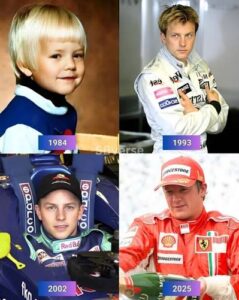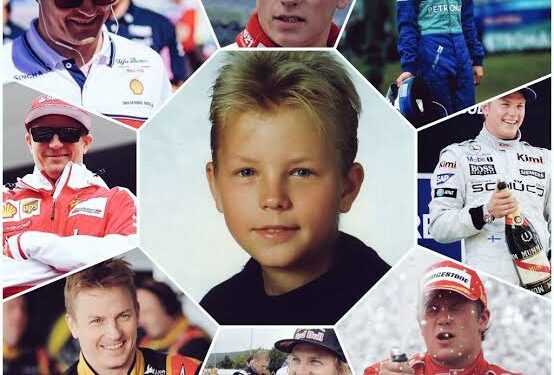
Netflix has finally done the unthinkable — turning the life of Kimi-Matias Räikkönen, Formula 1’s most enigmatic champion, into a sweeping biographical epic that stretches from the frozen streets of Espoo to the roaring sound of V10 engines and the quiet, hidden world of a man who never needed words to make history. What emerges is a film unlike any other motorsport story before it — darker, more intimate, more emotionally charged — a portrait of a legend built not on theatrics, but on truth.
The movie opens in a small, dimly lit garage in the suburbs of Espoo, Finland. A young boy with messy blonde hair is seen kneeling beside a tiny kart, tightening bolts with hands that are too small for the tools he’s using. In the background, we hear the hum of an old heater and the soft murmur of his mother, Paula, asking gently, “Kimi, don’t you ever get tired?”
He doesn’t even look up. “No.”
One word — but the first hint of a personality the world would one day learn to admire and never fully understand.
Netflix dives deep into the financial struggles of the Räikkönen family. The film shows his father, Matti, working late shifts, sometimes leaving before dawn and returning after dark. His hands are cracked, his face weary — but every extra hour means one more race his sons can attend. The movie makes it clear: Kimi did not come from privilege; he came from sacrifice. Viewers watch as Matti quietly sells possessions — tools, old radios, even a beloved motorcycle — just to pay for fuel and entry fees. Nothing is said aloud, but everything is felt.

Then comes the teenage Kimi, still quiet, still unreadable, but lightning-fast on the track. Netflix portrays his speed not as luck, but as instinct — a raw, unfiltered talent. In one early scene, a scout whispers to another, “He doesn’t drive the kart… he becomes it.”
The line is dramatic, sure, but when Kimi overtakes three rivals in a corner no sane driver should attempt, the audience understands exactly what he meant.
The film accelerates into his stunning rise through the racing ranks: Formula Renault, Sauber, McLaren, Ferrari. Each chapter is shot with gritty realism — engine smoke, rain-slicked paddocks, late-night debriefs under flickering lights. But Netflix doesn’t glorify the paddock glamour; it focuses instead on the emotional battles Kimi never spoke about. The pressure. The doubts. The expectations that kept piling up… and the loneliness that often came with being extraordinary.
But the film’s most powerful moments revolve around his family life — the part of Kimi the world rarely sees. His bond with his mother, the memory of his late father, his quiet devotion to his wife, Minttu, and the soft grin he reserves only for his children. The biopic reveals the man behind the legend: a father who sits on the living-room floor building toy racetracks, a husband who chooses to stay home instead of attending glamorous events, and a son who never forgot where he came from.
One emotional scene shows Kimi in his Ferrari room, staring at a championship trophy before turning it around so his children won’t see the fingerprints of a past filled with pressure.
“It’s just a thing,” he whispers.
He’s not talking about the trophy — he’s talking about fame itself.
Netflix handles his 2007 Championship with beauty and tension: the paddock chaos, the strategic battles, the roar of São Paulo. But the victory celebration is filmed not as a loud party — instead, it cuts to Kimi stepping outside alone, breathing in the night air, his expression unreadable. A voice-over says, “While the world screamed his name, he just wanted the quiet.”
The latter part of the movie explores his comeback, his evolution, his iconic one-liners, and yes — the wild, unfiltered side that made him beloved worldwide. But Netflix never exaggerates for the sake of drama. Instead, it shows the truth: a man who partied because life is short, raced because it was his language, and walked away from the noise because silence felt more honest.
The biopic ends with a chillingly beautiful scene. Kimi is at home in Switzerland, sitting by a lakeside with his children. The sun is setting. One of them asks, “Papa, do you miss racing?”
Kimi looks out at the water… long pause…
“Sometimes.”
Another pause, a small smile.
“But I like this more.”
And the film fades out — not with engines, crowds, or celebrations — but with quiet. The same quiet that defined his life, his personality, and his legacy.
Netflix hasn’t just made a movie. They’ve captured a soul. A rare thing. A Finnish thing. A Kimi thing.








